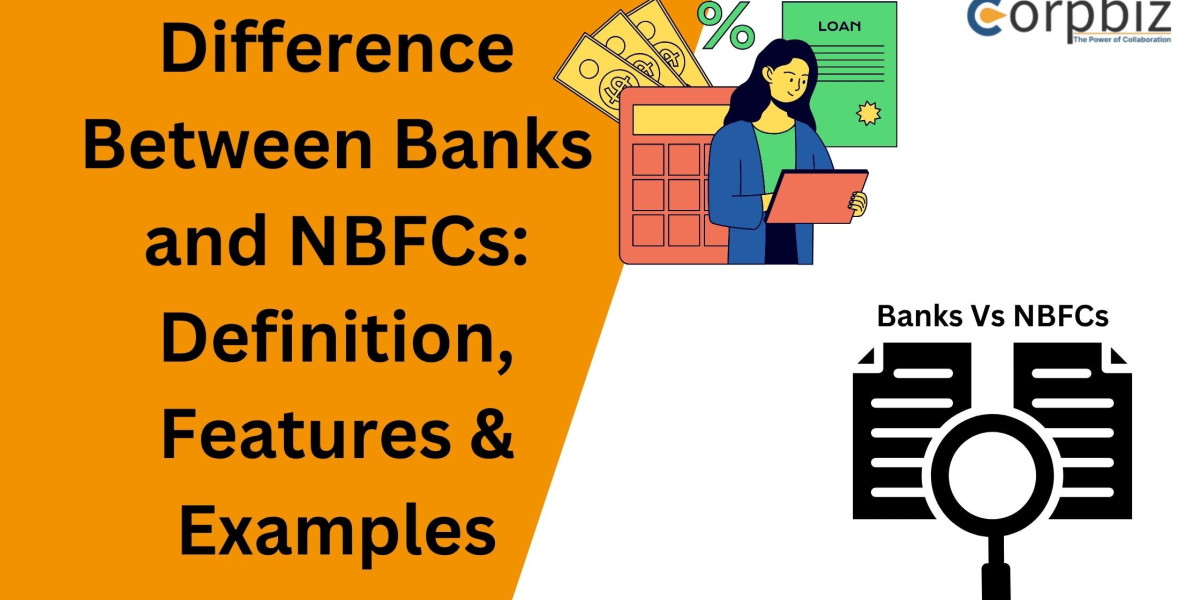Starting a business or investing in financial services? You might have come across two important terms—Banks and NBFCs (Non-Banking Financial Companies). Both offer financial services, but they work differently in many ways.
In this blog, we will explain the difference between Banks and NBFCs, their features, types, and practical examples. We’ll also touch on key topics like NBFC registration fees & process, P2P lending license, RBI Account Aggregator license online, and PPI license apply online—especially helpful for fintech startups and financial service providers.
What is a Bank?
A bank is a government-regulated financial institution that accepts public deposits and offers loans. Banks operate under the Reserve Bank of India (RBI) guidelines and follow the Banking Regulation Act, 1949. They are also covered under deposit insurance (DICGC), which means your deposits are safe up to ₹5 lakh.
Key Functions of Banks:
Accept deposits (savings, current, fixed)
Provide loans (home, personal, education, etc.)
Issue debit/credit cards
Offer digital banking (NEFT, RTGS, UPI)
Foreign exchange and wealth services
What is an NBFC?
An NBFC is a financial company that offers similar services like loans, credit, and investments—but it cannot accept traditional demand deposits like savings or current accounts. NBFCs are also regulated by the RBI but under the Companies Act, 2013, and the RBI Act, 1934.
They play a huge role in financial inclusion, especially in sectors where traditional banks don’t easily reach.
Major Differences Between Banks and NBFCs
Feature | Banks | NBFCs |
Regulation | Banking Regulation Act, 1949 | Companies Act, 2013 & RBI Act, 1934 |
Accept Deposits | Yes (savings, current) | No (except fixed deposits under special approval) |
Demand Deposits | Allowed | Not allowed |
Payment System Access | Yes | Limited |
Foreign Exchange | Allowed (authorized banks) | Not allowed |
CRR & SLR Requirement | Mandatory | Not required |
Deposit Insurance | Covered by DICGC | Not covered |
Credit Creation | Yes | Limited |
Account Opening | Offers all types of accounts | Doesn’t offer standard bank accounts |
Reach | Urban and rural | Focus on underserved and niche sectors |
Examples of Banks and NBFCs
Banks:
State Bank of India (SBI)
HDFC Bank
ICICI Bank
Bank of Baroda
NBFCs:
Bajaj Finance
Muthoot Finance
Tata Capital
Indiabulls Housing Finance
NBFC Registration Fees & Process in India
To start an NBFC in India, you must register with the Reserve Bank of India (RBI). Here’s a simple overview of the process:
NBFC Registration Process:
Company Incorporation under the Companies Act, 2013.
Raise Minimum Net Owned Funds (NOF) of ₹2 crores.
Open a bank account with NOF amount.
Prepare business plan, financial projections, and KYC documents.
Apply online on the RBI COSMOS portal.
Submit the physical copy of the application to the RBI’s regional office.
RBI verification and approval.
NBFC Registration Fees:
There is no official application fee charged by the RBI, but professional service providers like Corpbiz may charge service fees based on complexity and support required.
Special Licenses for Fintech NBFCs
With the rise in digital financial services, many fintech companies now apply for special licenses from the RBI. Below are some popular ones:
1. RBI Account Aggregator License Online
An Account Aggregator (AA) collects financial data from multiple sources (banks, mutual funds, insurers) and shares it securely with consent. You can apply for the AA license online via RBI:
Form fill-up on RBI portal
Submit KYC and business plan
Technical and data security compliance
RBI evaluation and approval
Corpbiz can assist you with the entire application process.
2. P2P Lending License Apply Online
Peer-to-peer (P2P) lending platforms connect lenders with borrowers digitally. These platforms need RBI approval to operate legally.
Incorporate a company
Capital of at least ₹2 crore
Develop platform infrastructure
Apply online on RBI portal
Follow NBFC-P2P guidelines
With Corpbiz, you can apply online for the P2P license in a streamlined way.
3. PPI License Apply Online
Prepaid Payment Instruments (PPI) like wallets and cards also need RBI approval. A PPI license is necessary for issuing closed, semi-closed, or open wallets.
Apply on the RBI’s official portal
Submit details about technology and compliance
Set up KYC and risk management framework
RBI approval and launch
Corpbiz offers end-to-end support for Online PPI license registration.
Why Choose NBFCs Over Banks?
NBFCs are gaining popularity because they:
Offer faster loan processing
Have flexible lending rules
Serve underserved sectors like SMEs, rural borrowers
Provide custom fintech services
How Corpbiz Can Help
At Corpbiz, we help entrepreneurs and fintech companies in:
NBFC registration
RBI Account Aggregator License online
P2P Lending License
PPI License application
Compliance support and RBI coordination
With years of experience, Corpbiz ensures a smooth, hassle-free licensing experience.
FAQs
Q1. Can NBFCs accept savings accounts like banks?
No, NBFCs cannot accept demand deposits like savings or current accounts.
Q2. What is the minimum capital requirement for NBFC registration?
You need at least ₹2 crore as Net Owned Funds.
Q3. Is RBI approval mandatory for P2P or PPI businesses?
Yes, you must get licensed by the RBI before starting such businesses.
Q4. Is the NBFC registration fee fixed?
The RBI does not charge a registration fee, but professional services may cost based on documentation and support.
Q5. Who can apply for an Account Aggregator license?
Any company meeting the RBI’s eligibility and compliance requirements can apply.
Final Thoughts by Atul Shukla
While banks are the traditional players in the financial space, NBFCs offer more flexibility, speed, and innovation. Both have their strengths, but NBFCs are particularly important for financial inclusion and fintech-driven growth in India.
If you're planning to enter the finance or fintech space, knowing the difference between Banks and NBFCs is the first step. And when you're ready to leap, Corpbiz is here to guide you through every license, approval, and compliance requirement.











